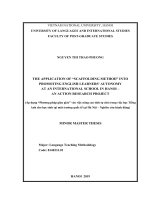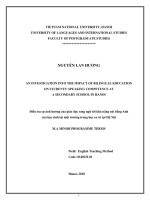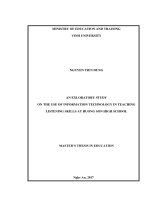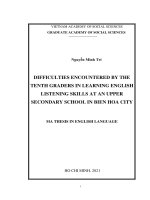The impact of integrating drama into teaching english peaking skills at ngo may secondary school, quy nhon city
Bạn đang xem bản rút gọn của tài liệu. Xem và tải ngay bản đầy đủ của tài liệu tại đây (1.09 MB, 120 trang )
MINISTRY OF EDUCATION AND TRAINING
QUY NHON UNIVERSITY
NGO THI BAO TRAN
THE IMPACT OF INTEGRATING DRAMA INTO TEACHING
ENGLISH SPEAKING SKILLS
AT NGO MAY SECONDARY SCHOOL,
QUY NHON CITY
Field: Theory and Methodology of English Language Teaching
Code: 8140111
Supervisor: Le Nhan Thanh, PhD.
Binh Dinh - 2023
BỘ GIÁO DỤC VÀ ĐÀO TẠO
TRƯỜNG ĐẠI HỌC QUY NHƠN
NGÔ THỊ BẢO TRÂN
TÁC ĐỘNG CỦA VIỆC TÍCH HỢP ĐĨNG KỊCH VÀO DẠY
KĨ NĂNG NĨI TIẾNG ANH Ở TRƯỜNG THCS NGÔ MÂY,
THÀNH PHỐ QUY NHƠN
Ngành: Lý luận và phương pháp dạy học bộ môn Tiếng Anh
Mã số: 8140111
Người hướng dẫn: TS. Lê Nhân Thành
Binh Dinh - 2023
i
STATEMENT OF AUTHORSHIP
The work contained in this thesis has not previously been submitted for a
degree or diploma in any university. I certify that, to the best of my knowledge
and belief, my thesis contains no material previously published or written by
any other person except where due reference is made in the thesis itself.
Binh Dinh, 2023
Signed:
Ngo Thi Bao Tran
ii
ACKNOWLEDGEMENTS
Without the great assistance of my supervisor, Dr. Le Nhan Thanh, this
work would not have been achievable. I am deeply indebted to my supervisor
since from the research proposal to the final version of this report, his vast
knowledge, practical experience in the field, great enthusiasm and meticulous
attention to detail have been an inspiration and kept me on track.
I would like to offer my special thanks to those who participated in my
research for their valuable time fulfilling the questionnaire and insightful
information from the interview. If it had not been for their willingness and
enthusiasm, I could not have collected important data for my study.
My deepest gratitude also extends to all of my wonderful classmates for
the time we shared as well as the information and experience we gained from
one another. Their continuous support and encouragement mean a lot to me in
the accomplishment of this study.
Last but not least, my family members have been tremendously significant
to me in the pursuit of this project. I would like to express my gratitude to my
parents, who have always supported and guided me in my endeavors. They are
the definition of positive role models.
iii
ABSTRACT
This thesis reports the result of action research on improving
students’ speaking skills through drama-based language teaching at Ngo May
secondary school in Quy Nhon City with the help of 34-grade 6th students as
research participants. The research addressed two issues (1) sixth-grade
students’ perceptions of the integration of drama into their English-speaking
lessons; (2) the integration of drama into English speaking classes affect their
English speaking skill. The instruments used for data collection and analysis of
the study include three tests and two questionnaires for the students, an
interview with ten students to know about difficulties and gaps in learning
English speaking lessons with drama activities. Research findings showed that
the drama technique was beneficial in helping students improve their speaking
ability and motivating them to learn English speaking skills. Based on the
findings, some implications would be given for both the teacher and the
students. This study is expected to be a useful suggestion to both teachers and
students in teaching and learning English speaking skills.
Keywords: drama, effect, perception, secondary school student, speaking
iv
TABLE OF CONTENT
CHAPTER 1. INTRODUCTION ..........................................................................1
1.1. Rationale ...........................................................................................................1
1.2. Aim and Objectives of the Study......................................................................2
1.2.1. Aim .............................................................................................................2
1.2.2 Objectives of the Study ...............................................................................2
1.3. Research Questions...........................................................................................2
1.4. Significance of the Study..................................................................................2
1.5. Scope of the Study ............................................................................................3
1.6. Organization of the Study.................................................................................4
CHAPTER 2. LITERATURE REVIEW..............................................................6
2.1. Speaking in Language Instruction ...................................................................6
2.1.1 Definitions of Speaking...............................................................................6
2.1.2. The Importance of Speaking Skills ............................................................7
2.1.3. The Components of Speaking Skills ..........................................................9
2.1.4. Characteristics of Successful Speaking Activities ...................................10
2.1.5. Communicative Language Teaching (CLT) ............................................11
2.2. Drama Techniques ..........................................................................................12
2.2.1. Definition of Drama Activities.................................................................12
2.2.2. Theoretical Assumption of Drama in the Classroom ...............................13
2.2.3. The Benefits of Using Drama Activities in EFL Class ............................14
2.2.4. Teacher and Student Roles .......................................................................20
2.2.5. Common Types of Drama Activities .......................................................22
2.3. Previous Studies..............................................................................................28
2.4. Summary.........................................................................................................34
CHAPTER 3. METHODOLOGY.......................................................................35
3.1. Design of the Study ........................................................................................35
3.1.1. Research Site ............................................................................................35
3.1.2. Participants ...............................................................................................36
v
3.1.3. Materials ...................................................................................................37
3.2. Data Collection ...............................................................................................37
3.2.1. The Pre-test and the Post-test ...................................................................37
3.2.2. The Interview ...........................................................................................41
3.2.3. The Experimental .....................................................................................43
3.3. Data Analysis..................................................................................................45
3.3.1. Quantitative Analysis of the Pre-test and the Post-test Data....................46
3.3.2. Interview Analysis....................................................................................47
CHAPTER 4. FINDINGS ....................................................................................50
4.1. Students’ Perceptions of Drama in Their English Lessons ............................50
4.1.1. Positive Engagement ................................................................................50
4.1.2. Skill Enhancement....................................................................................51
4.1.3. Development of Critical Thinking ...........................................................52
4.1.4. Development of Performance Abilities....................................................53
4.1.5. Psychological Transformation and Perspective Shift...............................53
4.1.6. Challenges and Anxiety............................................................................54
4.1.7. Comprehensive Reflections and Recommendations ................................54
4.2. The Effects of the Integration of Drama Into Speaking Classes ..........................58
4.2.1. Overview of Quantitative SPSS Data Analysis ............................................58
4.2.2. Performance Evaluation Based on the Pre-test and the Post-test Scores .61
4.3. Summary.........................................................................................................63
CHAPTER 5. DISCUSSION AND CONCLUSION..........................................65
5.1. Summary of the Major Findings.....................................................................65
5.2. Conclusions.....................................................................................................67
5.3. Limitations ......................................................................................................69
5.4. Implications ....................................................................................................70
5.4.1. Implications for EFL Teachers.................................................................70
5.4.2. Implications for School Administrators ...................................................70
5.4.3. Implications for Secondary School Students ...........................................71
5.5. Suggestions for Further Research ...................................................................72
vi
REFERENCES ...................................................................................................... 73
APPENDICES ......................................................................................................... I
APPENDIX 1A: LESSON SYLLABUS .................................................................. I
APPENDIX 1B: LESSON PLAN FOR TOPIC 1: MY NEW SCHOOL ..............III
APPENDIX 2: THE PRE-TEST.........................................................................VIII
APPENDIX 3: THE POST-TEST .......................................................................... X
APPENDIX 4: SPEAKING ASSESSMENT CRITERIA CARD.......................XIII
APPENDIX 5: SCORES IN THE PRE-TEST AND THE POST-TEST ............XIV
APPENDIX 6: INTERVIEW GUIDE .................................................................. XV
APPENDIX 7: EXCERPTS INDICATING STUDENTS’ PERSPECTIVES ON
THE IMPACT OF DRAMA ACTIVITIES IN ENGLISH SPEAKING
LESSONS ...................................................................................................... XVII
HANDOUT .......................................................................................................XXVI
vii
LIST OF TABLES
Table 4.1: Performance Grading Scale………………………………………40
Table 4.2: Paired Sample Statistics…………………………………………..58
Table 4.3: Paired Sample Correlations……………………………………….59
Table 4.4: The Results of the Pre-test and the Post-test………………………61
viii
LIST OF FIGURES
Figure 4. 1: Comparing the Results of the Pre-test and the Post-test………62
1
CHAPTER 1. INTRODUCTION
Chapter one presents the introduction to the study. This chapter discusses
six parts, namely the rationale, the aim of the study and research question, the
scope of the study, the significance of the study, and the outline of the study.
1.1. Rationale
Speaking may be the most important and interesting component of any
language. It represents the most natural and common form of communication
among humans. We can easily say that people speak more than they write, so
speaking is also probably the main goal for anyone studying a foreign language.
Despite this, it can be often obstructed by a series of factors, such as shyness,
lack of self-confidence, fear of other people’s judgment, laziness, and so forth.
Sometimes it is not simple to overcome such difficulties people may have with
oral communication in a foreign language and this can often lead to stress,
discouragement and lack of interest in learning.
Having been teaching English for several years at an English centre, I have
found that most of my students make not so much progress in their learning of
English, especially speaking. Students seemed to use their first language most
of the time, making little or no effort at all when practising their speaking skills.
Also, they felt embarrassed and contained from speaking in front of their mates,
showing annoyance, bother and no collaboration, especially, students in grade
6 because they do not have enough lessons to practice speaking English in the
class.
How to improve speaking skills for students becomes my biggest concern.
I always try to find out the best ways to encourage my students to learn English
better and be confident to speak English in and outside the classroom. I have
2
read many books and articles about the advantages of using drama activities in
teaching English. I have found much research in our country and the world
about using drama techniques to improve students’ Speaking English skills. I
could try to do research on using drama-based language teaching to improve
sixth-grade students’ speaking skills at a secondary school. I want to
investigate the ways that Drama activities enhance students’ speaking skills
and motivation in the EFL secondary classroom.
1.2. Aim and Objectives of the Study
1.2.1. Aim
This study aims to examine the impact of integrating drama into teaching
English-speaking skills to secondary school students.
1.2.2 Objectives of the Study
The study aims to achieve the following objectives:
- to examine sixth-grade students’ perceptions of the integration of drama
into their English-speaking lessons, and
- to investigate the effects of integrating drama into English-speaking
lessons.
1.3. Research Questions
The study will be guided by two research questions below:
1. What are sixth-grade students’ perceptions of the integration of drama
into their English-speaking lessons?
2. To what extent does the integration of drama into English speaking
classes affect their English speaking skill?
1.4. Significance of the Study
This study holds paramount significance both theoretically and practically
in the context of enhancing English language learning, specifically focusing on
3
speaking skills through drama-based language teaching. The theoretical
contribution lies in the domain of action research, aiming to advance our
comprehension of the influence of drama techniques on students' speaking
abilities and their motivation in English lessons. By delving into unexplored
aspects, the study seeks to unveil novel insights, enriching the existing body of
knowledge.
From a practical standpoint, this research serves as a crucial resource for
English educators, offering innovative strategies to cultivate speaking skills in
the classroom. The incorporation of drama techniques provides a dynamic and
interactive approach, fostering communicative competence among students.
English teachers can leverage the research findings to infuse creativity into
their teaching methodologies, creating engaging environments that positively
impact students' motivation and proficiency in spoken English.
Furthermore, this study serves as a foundation for future researchers in the
field, offering a reference point for continued exploration and refinement of
classroom practices. English educators can draw upon the practical
implications derived from the research, gaining valuable guidance to elevate
the quality of English language instruction. Ultimately, this study contributes
to both theoretical understanding and practical applications, presenting a
comprehensive resource to enhance the teaching and learning of English
speaking skills in secondary school contexts, such as Ngo May Secondary
School in Quy Nhon City.
1.5. Scope of the Study
This study specifically delved into the perceptions of 6th-grade students
regarding the integration of drama into English speaking lessons, aiming to
assess its effectiveness in enhancing their language skills. The deliberate
exclusion of students from grades 7, 8, and 9, along with the perspectives of
teaching assistants, allowed for a targeted examination. The primary focus on
4
the unique context of 6th-grade students enabled a detailed exploration of their
attitudes and the impact of incorporating drama into language learning.
The primary objectives were to uncover how 6th-grade students perceived
the use of drama in their English speaking lessons and assess the effectiveness
of this pedagogical approach on their language proficiency. Research questions
centred on understanding students' experiences, preferences, and the specific
aspects of language learning influenced by drama activities. The intentional
exclusion of students from grades 7 to 9 and the perspectives of teaching
assistants maintained a clear focus on the targeted 6th-grade student group,
providing insights directly relevant to their unique educational context.
Conducted during the first semester of the 2021 academic year, the research
captured a snapshot of the specific conditions and dynamics present during that
period. The research may have limitations in terms of generalizability due to
being conducted within a specific school or educational region. Utilizing
qualitative research methods like interviews and surveys, the study aimed to
gather rich and detailed data on the perceptions and experiences of 6th-grade
students regarding the integration of drama into language lessons. Potential
constraints might have arisen in terms of resource availability, especially
concerning data collection and analysis. Additionally, access to relevant data
from participants could have posed limitations to the study.
1.6. Organization of the Study
Chapter 1: Introduction presents the rationale, aim and objectives of the
study, research questions, significance of the study, scope of the study and
organization of the study.
Chapter 2: Literature review includes four parts. The first one focuses on
speaking in language instruction. The definition of drama activities, the
theoretical framework, the benefits of using drama activities, and common
drama activities in EFL classrooms are given in the second one. The third one
5
is about Previous Studies in the world and the last one referred to the summary
of this chapter.
Chapter 3: Methodology - in this chapter, the introduction of the research
method including data collection instruments, data collection procedure, and
data analysis are presented.
Chapter 4: In this chapter, the research findings are presented based on the
results of tests and interviews. The data collected from these two primary
sources contribute to a comprehensive understanding of the impact of drama
activities on students' English speaking skills.
Chapter 5: Discussion and conclusion, which is the last chapter, followed
by references is the summary of the whole study. The limitations of the study
and suggestions for further studies are also recommended.
6
CHAPTER 2. LITERATURE REVIEW
This chapter aims to provide readers the theoretical descriptions of
speaking skill, the importance of speaking skills, characteristics of Successful
Speaking Activities, and communicative language teaching. In addition,
background information about drama techniques and preceding studies will be
displayed specifically.
2.1. Speaking in Language Instruction
2.1.1 Definitions of Speaking
There are a lot of definitions of speaking. According to Webster (1980),
speaking has a variety of meanings: a. to tell, to say, to make known or as by
speaking, to declare; to announce. b. to proclaim, to celebrate. c. to use or be
able to use (a given language) in speaking.
Byrne (1986) stated that “oral communication (or speaking) is a two-way
process between speaker and listener and involves the productive skill of
speaking and the receptive skill of understanding”. Based on the previous four
definitions, it can be synthesized that speaking is the process of sharing with
another person, or with other persons, one’s knowledge, interests, attitudes,
opinions, or ideas. Delivery of ideas, opinions, or feelings is an important
aspect of the process of speaking which a speaker’s idea becomes real to him
and his listeners.
Speaking is an interactive process of constructing meaning that involves
producing receiving and processing information. its form and meaning are
dependent on the context in which it occurs, including the participants
7
themselves, their collective experiences, the physical environment, and the
purposes for speaking (Brown, 1994, p. 62). In addition, Nunan (1999, p. 25)
stated speaking requires that learners not only know how to produce specific
points of language such as grammar, pronunciation, or vocabulary, but also that
they understand when, why, and in what ways to produce language.
From these definitions of speaking, I adopted the definition of speaking
from Nunan for my research. I wish, drama activities helped my students not
only how to produce specific points of English such as grammar,
pronunciation, or vocabulary, but also that they understand when, why and how
to use English in real communication.
2.1.2. The Importance of Speaking Skills
Efrizal (2012) and Pourhosein Gilakjani (2016) emphasized the
importance of speaking for interpersonal interactions, stating that speaking is
the primary means of conveying ideas and messages orally. They argued that
to promote English communication among students, real-life communication
should be encouraged and students should be actively engaged in using the
language.
Richards and Rodgers (2001) pointed out that traditional teaching
methods often neglected the development of speaking skills in favour of
reading and writing skills. For instance, in the Grammar-Translation method,
reading and writing were prioritized, while speaking and listening skills were
not considered as significant.
Ur (2000) asserted that among the four language skills - listening,
speaking, reading, and writing - speaking is the most crucial for effective
communication.
Speaking has acquired great importance since it is referred to as an
interactive process of constructing meaning that involves producing, receiving,
8
and processing information (Brown, 1994; Burns & Joyce, 1997). English has
become primordial worldwide for it has become a lingua franca. Therefore, it
is the main source for communicating in many fields.
Richards (1990) states that the mastery of speaking skills in English is
seen as a priority for many EFL learners across the world. Moreover, he adds
that learners consequently often evaluate their success in language learning as
well as the effectiveness of their English course based on how well they feel
they have improved in their spoken language skills.
One of the most important skills in EFL is speaking skill. According to
the Oxford Dictionary, speaking is the action of conveying information or
expressing one's thoughts and feelings in spoken language. From the definition,
it concludes that speaking is an expression of sending messages from a speaker
to listeners.
According to Rao (2019), effective communication in today's globalized
world relies heavily on speaking skills, considered the most crucial among the
four language skills. Given the widespread use of English worldwide, learners
must acquire proficiency in English communication to succeed in their
respective fields. Consequently, the classroom environment is an optimal
setting for developing strong communication skills, particularly speaking
skills.
Speaking skill is an interactive process of constructing meaning that
involves producing and processing information (Brown, 1994; Burns & Joyce,
1997). Harmer (2001: 39) emphasizes that speaking skills should receive equal
attention as reading and writing skills, whether in one's native language or
when learning a second or foreign language. The ability to effectively
communicate through speech is often seen as the most significant aspect of
language learning, and success is evaluated based on one's capability to engage
in conversation using the target language.
9
Teaching the skill of speaking is a crucial aspect of acquiring a second
language. The capacity to effectively communicate in a second language
significantly enhances a learner's academic achievements and success in
various life stages (Kayi, 2006).
In short, speaking is one of the important skills in English as a Foreign
Language (EFL). By the importance of speaking, the goal of English teaching
is to make students able to communicate well.
2.1.3. The Components of Speaking Skills
There are various interpretations of fluency in spoken language. One
perspective defines fluency as the ability to express intentions in
communication with minimal hesitation and pauses, aiming to avoid
disruptions or barriers in the conversation (Nation, 1991). Another definition
by Bailey (2005, p. 5) characterizes fluency as the capability to speak smoothly,
confidently, and at a pace aligning with the standards of the native speech
community. In essence, fluency encompasses the qualities that render speech
natural and typical, incorporating native-like features such as pausing, rhythm,
intonation, stress, speaking rate, and the use of interjections and interruptions
(Richards, Platt & Weber, 1995, p. 108). Hedge (1993) attributes fluency to the
skill of seamlessly linking speech units together without difficulty or
inappropriate slowness.
These definitions predominantly emphasize the smoothness and confidence
in generating speech, minimizing hesitations and pauses. The common thread
in these perspectives is that fluency in speaking places greater emphasis on the
meaningful and natural aspects of utterances rather than on strict adherence to
grammatical structures or forms. In the context of this research, the authors
demonstrate that fluency assumes a pivotal role in learners' speaking skills,
prioritizing reduced hesitation, fewer pauses, and increased speaking speed to
bolster learners' confidence in verbal expression.
10
2.1.4. Characteristics of Successful Speaking Activities
Sometimes spoken language is easy to perform, but in some cases, it is
difficult (Pollard, 2008). So that students can carry out the successful speaking,
they have to fulfil some characteristics of the successful speaking activity
below.
According to Ur (1996), students should have chances to talk a lot using
the target language. What is difficult to achieve, although still possible, is the
desire to have the time devoted to such an activity filled with learner talking
time to the maximum. What a teacher can do to promote speaking is to divide
students into groups. Working in groups increases the amount of practice
learners can get, as well as the amount of their speaking. When students sit in
a small circle, their inhibitions are lowered and thus they are encouraged to
speak.
Another feature of a successful speaking activity, pointed out by Brown
(2001) is participation. All students should get a chance to speak; moreover,
contributions ought to be fairly evenly distributed. Therefore, teachers’ task is
to strive towards engaging the less active learners and make sure that all
students are involved in an equal way.
Dobson (1989) suggests that to make sure that every learner can practice
the target language, the teacher can appoint a group representative responsible
for equal participation among peers.
Motivation also plays an important role in a successful lesson devoted to
speaking. Without showing genuine concentration on performing a task, the
class faces no efficiency. There are two main kinds of motivation: intrinsic
motivation and extrinsic motivation.
Harmer (2001) explained that extrinsic motivation is driven by external
factors such as the desire to achieve a certain grade, financial incentives, or the









